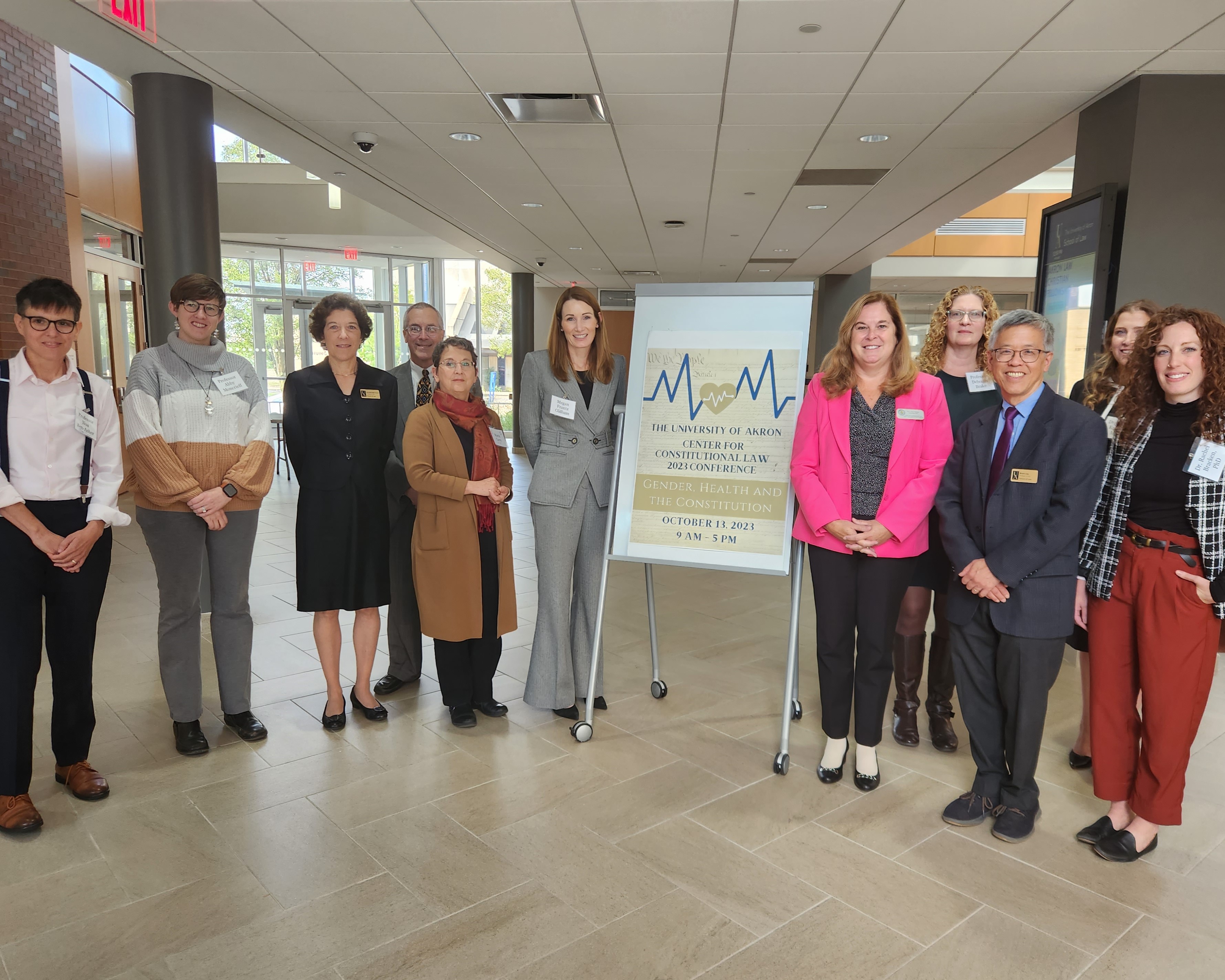Con Law conference focuses on Gender, Health and the Constitution

A number of conference panelists and moderators posed outside the courtroom during a break.
The Center for Constitutional Law at The University of Akron School of Law held its annual conference on Oct. 13. This year’s theme was Gender, Health and the Constitution. The Center is one of four national resource centers established by Congress, along with Drake University, Howard University and the University of South Carolina, to support research and public education on issues of constitutional law. It includes five faculty fellows, student fellowships, a J.D. certificate program and an online journal, ConLawNOW.
“Speakers at this year’s conference all agreed on the need for attention to these issues of gender discrimination in the health care context,” said Akron Law Professor and Con Law Center Director Tracy Thomas. “The 20 featured panelists included national scholars and local practitioners in both law and medicine who provided a broad range of expertise from theoretical to practical implications.”
Those attending the conference included judges, attorneys, academics, students and members of the community interested in learning more about these emerging issues. Akron Law faculty Bernadette Bollas Genetin, Mike Gentithes, Dr. George Horvath and Brant Lee moderated the panels.
The first topic was reproductive rights and the profound legal and medical changes since the U.S. Supreme Court’s invalidation of the long-recognized fundamental right to reproductive choice. Maya Manian, director of the Health Law and Policy Program at American University, recommended a new theoretical approach grounded in health justice. Dr. Allison Kreiner, medical analyst with Plakas Mannos, revealed the stark detriment of the invalidation to patients in practice. Legal scholars Naomi Cahn from the University of Virginia, Tiffany Graham from Touro Law and Sonja Sutter from George Washington University discussed applications in the contexts of minors’ rights and assisted reproduction.
The second panel turned to the topic of gender identity. Panelists spoke about recent bans on gender-affirming care, the history and meaning of gender identity, and new laws prohibiting transgender girls from participating in sports. Noted national legal scholars speaking on gender identity included Deborah Brake from the University of Pittsburgh, Noa Ben-Asher from St. John’s University, Jennifer Bard from the University of Cincinnati, Susan Keller from Western State University and Dara Purvis from Penn State University.
The next panel discussion focused on bias in medical science and the ways in which medical science excludes women in research, resulting in significant negative physical effects. Panelists diagnosed existing problems and suggested preventive measures. These legal experts on medical science included former Akron Law Professor Jane Moriarty, now at Duquesne University; Jennifer Oliva from Indiana University; and Aziza Ahmed from Boston University. Dr. Rachel Bracken from Northeast Ohio Medical University also presented.
The final panel of the day focused on the broader meanings and implications of medical autonomy. Professor Thomas discussed Ohio’s unique health care freedom constitutional amendment and how it might apply to reproductive freedom. Abby Moncrieff, co-director of the Health Law Center at Cleveland State University, considered the theoretical neutrality bases of medical autonomy and how they applied to several of the emerging legal issues discussed at the conference, including gender-affirming care and reproductive rights. Attorneys Marie Curry from Legal Aid and Megan Franz Oldham ’05, partner at Plakas Mannos, discussed how these issues from daily medical practice. Oldham addressed how medical malpractice claims arise when physicians discount women patient’s reported symptoms. Curry shared information about racial impacts and discrimination in pregnancy care, and alternative patient-centered approaches to redress these concerns.
Many papers presented at the conference will be published in the Spring symposium of ConLawNOW.
